While the 7.62×39 is considered the “intermediate assault rifle cartridge against which all others are judged,” few people actually know what kind of performance they can expect from the cartridge out of an AK. For this article, I decided to test seven 7.62x39mm loads, some similar, several very different. I chose them based on a number of factors — availability, price, and (advertised) performance. My ammo list included American Eagle FMJ, premium defensive ammo from Winchester and Hornady, and steel-cased Russian-made ammo from Wolf and Barnaul. My plan was to measure velocity, accuracy, and terminal performance using ballistic gel blocks.
Group Therapy
The AR-15 is an inherently more accurate design than the AK. The average accuracy across the board for commercial ARs currently being made in this country is 1.2 MOA, which is outstanding. When it comes to AKs, most guns will do 3–4 MOA, depending on ammo, which is more than acceptable accuracy for both defensive and hunting use at the distances you should be using this cartridge. However, it is shooting up to that accuracy potential of the AK which is the challenging part — if you’re just using the iron sights. The sight radius on the AK is short, about the same as on an old-school CAR-15 … but nobody is running iron sights on their ARs any more. Heck, most ARs don’t even come with iron sights, whereas every AK does. However, more and more AKs are set up from the factory with the ability to mount optics. A number of aftermarket companies offer optic-mounting options for AKs as well, either on the handguard or on the rear sight base, if your gun doesn’t have a scope mount rail.
Read about the unique history of the famous CAR-15 Rifle Here
While I own three AKs, only one of them is even set up from the factory to accept a scope, and I wasn’t convinced of its accuracy potential — and I wanted to use a scope, as shooting groups with iron sights would be more of a referendum on my aging eyes than it would be a test of the ammo. Luckily, I live close to RS Regulate, makers of the best AK scope mounts in the world, and borrowed one of their AKs to do accuracy testing. I had my choice of several different rifles, and chose a “standard” AK that should show typical accuracy potential. In this case, the AK was made in 1969 in Poland, which at the time was a Warsaw Pact country, which makes it a true Commie AK. It currently sports laminated wood furniture as well as an RS Regulate scope mount, onto which was attached a Vortex Viper 2.5-10X scope. 10X is more than enough for the accuracy part of this testing.
Unlike with .223/5.56 loads, there isn’t a wide variation in bullet weights in 7.62×39. The lightest bullet tested was the Winchester PDX1 at 120 grains, and the heaviest were the 125-grain softpoint loads from Wolf and Barnaul. To measure the velocity of the ammunition I used my Oehler Model 35P chronograph. This chrono takes a few minutes to set up, but then it is an absolute tank and provides consistent accurate results.
If you check out the accompanying table you’ll see that except for the historically slow Hornady load, all the remaining loads tested ran within 100 fps or so of each other. The standard deviation for most of the loads was single digits, which is outstanding. Assume your 7.62x39mm load will throw a 123–125-grain bullet downrange around 2,400 fps, and you’ll be right almost every time. The Barnaul HP, the Hornady SST, and the American Eagle FMJ provided the best accuracy, all producing 2.5 MOA groups or less, but there was not a widespread disparity. The “worst” groups were still right around 4 MOA, which is perfectly acceptable for an AK. The single best group I fired was a 1.50″ smoker with American Eagle FMJ, which I could not replicate. And a reminder — your gun may shoot far differently with the same ammunition.
There’s Always Room For Jell-O
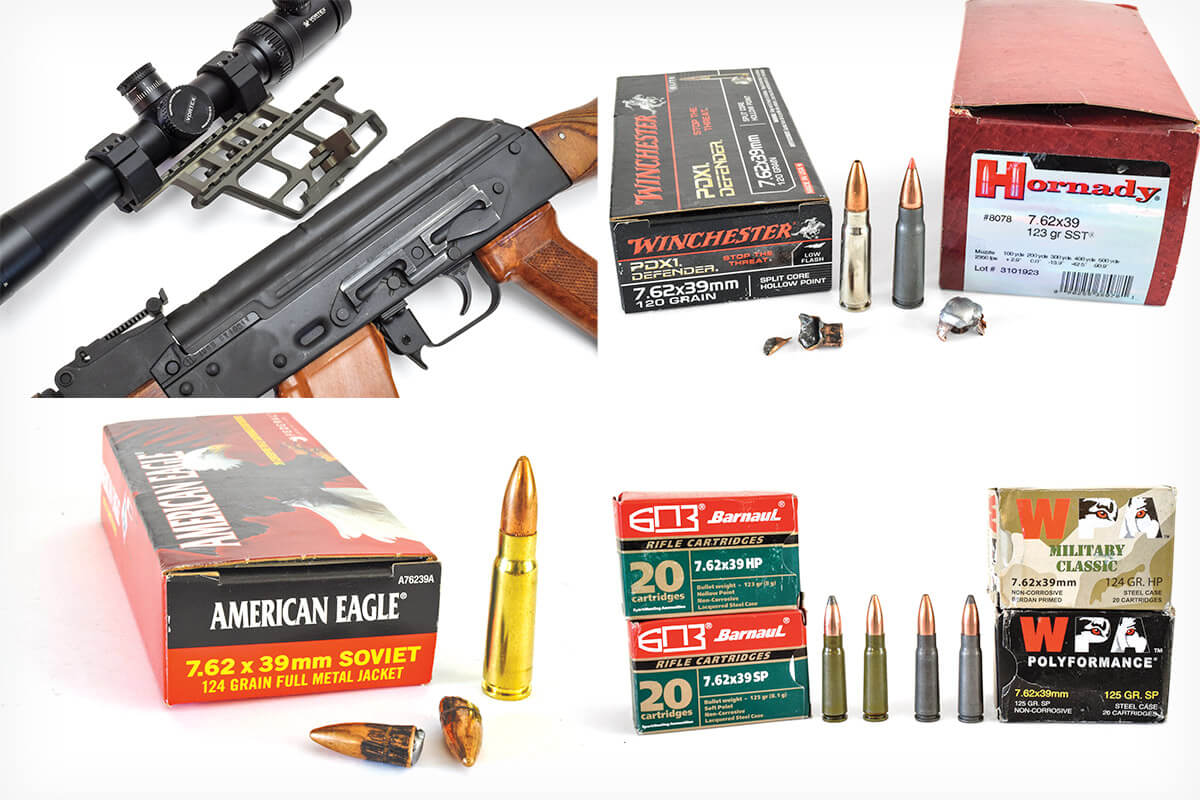
Empirically, you could argue that the best way to test the terminal performance of ammunition was to shoot various people with it and observe the results. This has actually happened (we learned a lot about the effectiveness of the 5.7×28 cartridge on people after the Fort Hood terrorist attack for example), but generally here in America we frown on fatal human testing. Animals are a decent substitute, pigs especially, but you run into the same problem you do with people — neither people nor animals have the same construction throughout their bodies. One bullet may hit a rib and get deflected. Another may miss the ribs but hit the liver. One may go through a lot of muscle before hitting bone. Muscle, intestines, organs, all have different densities and resistance to bullets.
In the 1980s, the idea of using ballistic gel as a tissue simulant became popular. Ballistic gel is just that — edible gelatin, however mixed in a ratio to make it much thicker than your average Jell-O dessert. The FBI standardized 10% ballistic gel as a good tissue simulant, which you make by adding one pound of powdered gel to nine pounds of water. The FBI even came up with a procedure to determine if the gel met the proper spec — shoot a steel BB into it from an airgun, travelling at a certain average velocity (590 fps +/- 30 fps), and if that BB penetrated the gel block a certain distance (8.5 cm), it was a properly calibrated gel block. Gel blocks allow you to compare apples to apples — the block is the same every time, so the only variable is the bullet performance. No artificial simulant is going to provide you an exact match to people, but 10% ballistic gel is generally considered a good “rough guess” at human flesh.
When it comes to bullet performance in gel blocks, the FBI designed a specific protocol around testing bullets, but they were originally only concerned with handgun bullets, as few FBI Special Agents at the time were issued rifles, and nobody was concerned about the “stopping power” of rifles. However, their penetration recommendations for handgun bullets are worth keeping in mind — you want a minimum twelve inches of penetration to reliably hit the bad guy’s organs from any angle, and any penetration over eighteen inches generally increases your chances of the bullet going through the bad guy and hitting an innocent bystander.
For this article, I used Clear Ballstics blocks. These blocks are actually polymer, not gelatin, but formulated to provide similar performance to FBI-spec gel blocks. Extensive testing has shown that bullets fired into these blocks expand the same as they do standard gel blocks, but on average penetrate 10% more deeply. Keep that in mind as you look at my results.
For testing I first fired bullets from each of the seven chosen loads into bare blocks. If a bullet doesn’t perform well in bare blocks it won’t perform well, period. After that I fired bullets into blocks covered with the FBI’s “heavy clothing” barrier, which consists of a layer of denim over a cotton/poly sweatshirt over two layers of cotton shirt material. Clothing, as thin as it is, tends to slow down the expansion of bullets passing through it, and this test is important as most bad guys you’ll run into will be wearing clothing. The Clear Ballistics blocks are each roughly 16 inches long, so I laid several blocks end-to-end when testing rifle ammunition.
Tale of the Tape
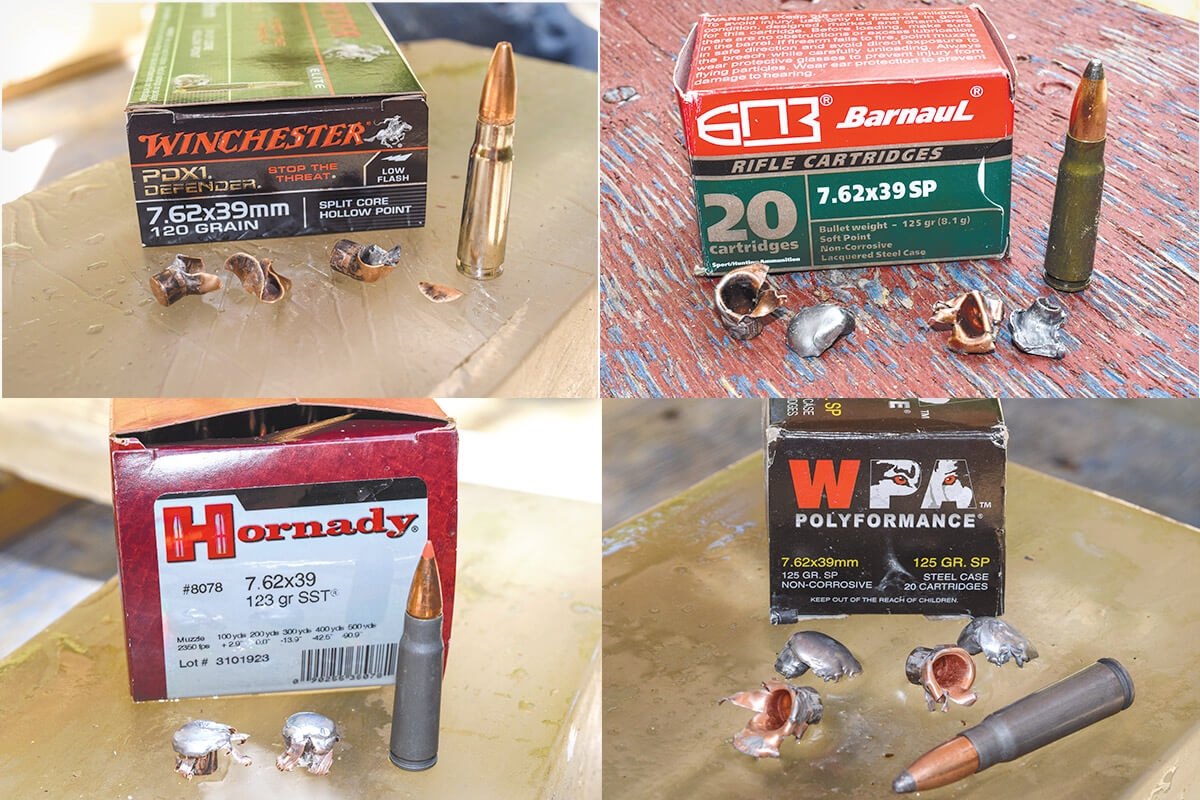
First up for testing was the American Eagle 124-grain full metal jacket load. FMJ loads provide a nice baseline against which the performance of “expanding” bullets can be measured. And, honestly, a lot of people like FMJ ammo for certain purposes, such as punching through barriers. Through the barrel of my borrowed semi-custom AK the AE 124-grain FMJ load provided an average 2,368 fps. The bullet penetrated the bare block 31.25-inches, nearly reaching the end of the second block. Recovered weight of the bullet was 118.8 grains, or 95.8%.
Recommended
A quick aside — as the bullet zipped right through the first block and into the second, not as much energy was dumped into the first block, but still it jumped off the table. Handgun bullets, when fired into gel blocks, rarely make the heavy blocks do more than wiggle. Rifles, on the other hand, are dumping far more energy into the blocks, and you’ll find they often jump several inches into the air, often high enough to fall right off the support table. Considering each block weighs roughly eighteen pounds, this is impressive.
When you watch this in slow motion you’ll see it’s because the bullet, impacting at fast rifle speeds, causes a large “temporary wound cavity” inside the block, often stretching it far beyond its original dimensions. This temporary wound cavity, caused by overpressure and hydrostatic shock, is why rifles are far more effective fight stoppers than handguns. Handgun bullets just don’t travel fast enough to cause it — it generally requires velocities over 2000 fps.
I had to cut off a corner of my lead block so, when I picked it up, I knew the orientation it had been in prior to jumping around or off the table. The recovered bullet was flattened and slightly bent. This flattening of the bullet happens after initial penetration — the bullet starts to yaw and travel sideways, which deforms it. This is common, and often causes it to shoot out of the block at an angle (and I will admit this happened to me, I had to fire a few rounds before I got one that stayed completely in the block). The good thing about FMJ bullets is that they are the least affected by barriers. When fired through the heavy clothing barrier into the block, the bullet penetrated 31-inches and displayed a flattened shape, retaining 118.5 grains (95.5%) of its weight (nearly identical performance).
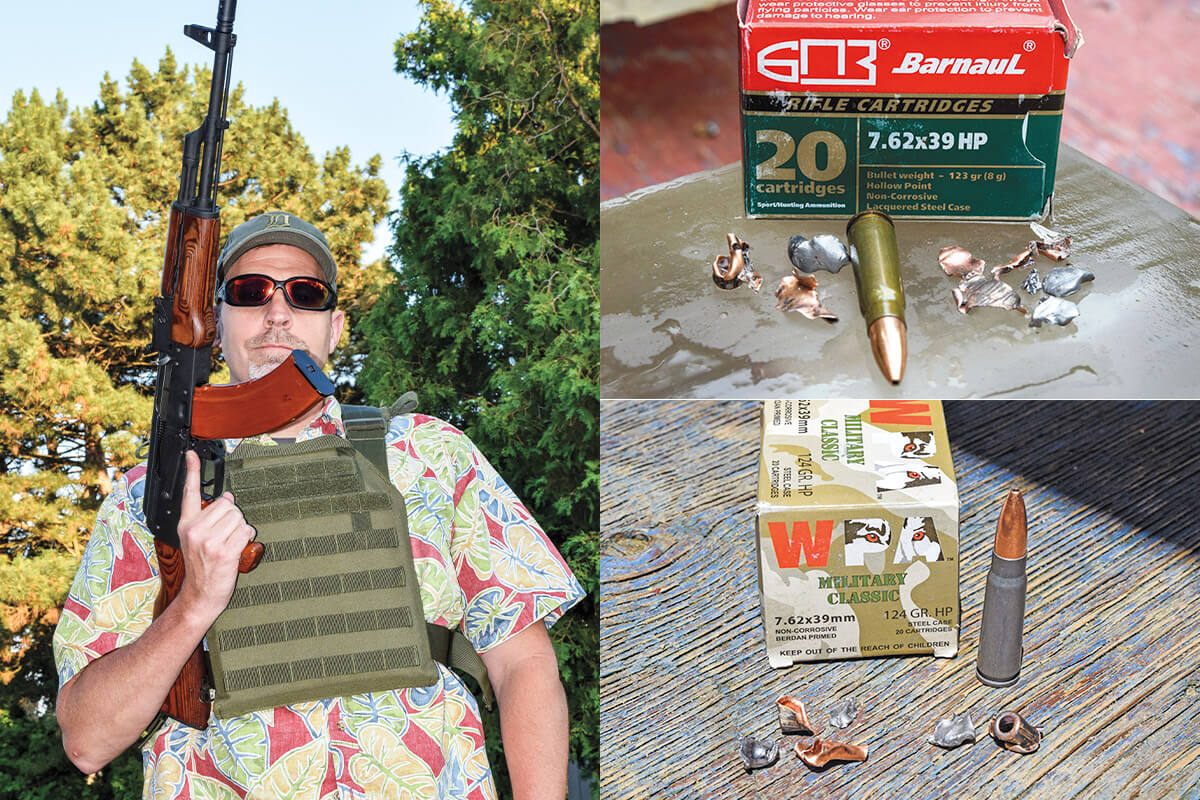
The 123-grain Hornady SST (Super Shock Tip) bullet is just about the opposite in construction to a tough FMJ bullet. The SST bullet has a red polymer tip sitting in a hollow-point bullet, and is loaded into a steel case. The lead core is mechanically bonded to the jacket to keep them together after impact. Upon impact that tip is designed to be pushed into the hollow point, expanding it rapidly. The Hornady load provided 2,291 fps, the slowest of all loads tested. In bare block the bullet penetrated 21.75 inches and expanded to .70″. The recovered bullet weighed 110.4 grains, which meant it retained 89% of its weight.
When fired through the clothing barrier, the bullet penetrated the block 23.5 inches. The recovered bullet had an expanded diameter of .66″ and a total recovered weight of 112.3 grains, or 90.5%. This is excellent performance. These bullets performed a lot like traditional handgun hollowpoint bullets — good expansion, with the jacket peeling back but not separating from the lead core.
Next up for testing was the Winchester PDX1 Defender load. This 120-grain bullet is a split-core hollow-point design and designed specifically for personal defense against two-legged predators. Upon impact the front half of the bullet is designed to expand and/or fragment while the base penetrates deeply, giving you both expansion and penetration. The base lead is bonded to the jacket.
Out of the loaner AK the Winchester load provided 2,340 fps. In bare block the bullet performed as designed — a big chunk of the front of the bullet jacket (weighing 12.9 grains) peeled off and penetrated 19 inches. The base, weighing 66.5 grains and .53″ in diameter, penetrated 25.5-inches. Total recovered weight of the base and jacket fragment was 79.6 grains or 66%.
When fired through the clothing barrier the PDX1 bullet penetrated 27 inches. One small fragment broke off the nose and penetrated 26 inches. The base weighed 102.0 grains and expanded to .54″. The fragment weighed 3.4 grains. Total recovered weight of the bullet and fragment was 105.3 grains, or 87.7%. These recovered bullets are ugly, but they are performing exactly as intended.
Wolf’s Military Classic load features a 124-grain HP bullet loaded into a steel case. This load chronographed at 2,456 fps. Testing showed me this bullet has a thin jacket and a relatively soft lead core, and expansion was explosive. Just tracking down all the bits and pieces in the ballistic blocks was often problematic. In bare block the lead core of the bullet penetrated 18 inches, deeper than any of the other fragments. The copper jacket around the base of the bullet separated from the lead core and only penetrated 11 inches while expanding to .46″. Total recovered weight of the bits large enough to find and recover was 72.7 grains, or 58%.
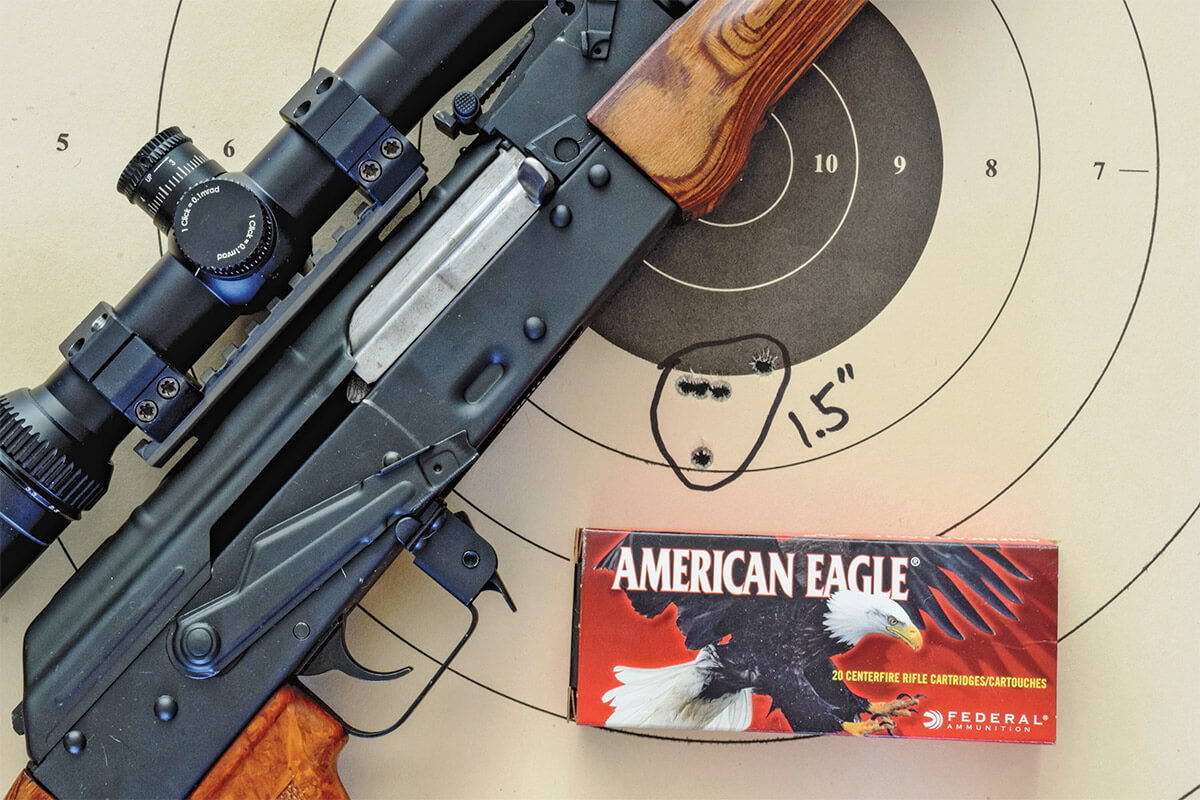
When fired through heavy clothing into the block the lead core separated from the jacket and penetrated 21.5-inches. The jacket around the core and several other lead fragments penetrated 12 inches. The jacket expanded to .58″, and total recovered weight of lead and jacket was 83.1 grains, or 67%. If you want violent expansion and fragmentation, and arent’ that interested in penetration, barrier or otherwise, this seems to be the load for you.
Next up was the Wolf Polyformance load, which offers a 125-grain soft point bullet in a steel case. “Soft point” bullets, which show exposed lead tips above jackets, are some of the original expanding rifle bullets — they’re simple, but they work. This load produced 2,447 fps. In the bare block the jacket separated from the lead core. The lead core/base penetrated 18 inches. The jacket penetrated 12.5 inches, and had an expanded diameter of .64″. The recovered base weighed 85.3 grains, and total recovered weight of the bullet was 114.3 grains, or 91.4%. Through heavy clothing the jacket again separated from the lead core. The lead core/base penetrated 21 inches and had a recovered weight of 81.4 grains. The jacket expanded to .60″ and penetrated 15 inches. Total recovered bullet weight was 109 grains, or 87.2%.
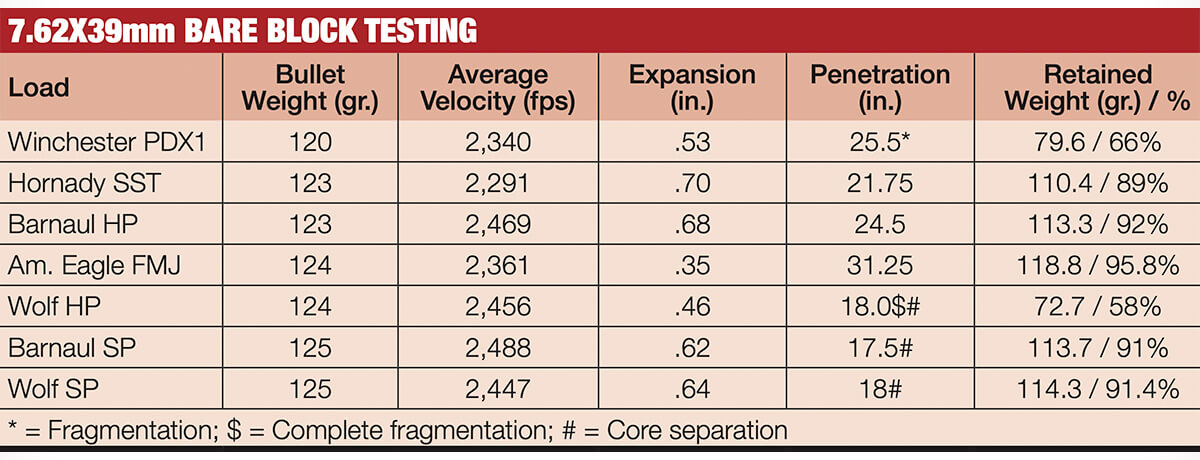
A reminder — I was testing these bullets on blocks twelve feet away. At further distances the bullets would be travelling slower, and that reduced velocity will result in less expansion/fragmentation and probably deeper penetration. As many people who own AKs tend to prefer steel-cased foreign-made ammo for its affordable price, in addition to the Wolf ammunition above I decided to test two lacquered steel-cased loads made by Barnaul, made in Russia (as is the Wolf ammunition). First up from Barnaul was a 125-grain SP, which provided 2,487 fps. In bare block the jacket separated from the lead core. The lead core, weighing 83.3 grains, penetrated 17.5-inches. The jacket peeled off and only penetrated 12.5-inches, with an expanded diameter of .62″. Total recovered weight of the core and jacket was 113.7 grains, or 91%. When fired through the clothing barrier the jacket and core again separated, but they stayed together far longer. The jacket penetrated 16 inches, and the lead core penetrated 17.5 inches. The lead core weighed 75.9 grains, and total recovered weight of the jacket and core was 103.6 grains for 83% weight retention.
Finally I tested a 123-grain HP load from Barnaul. It provided 2,475 fps. In a bare block the jacket separated into two large pieces which penetrated 12.75–13.5-inches. The lead core continued on, penetrating 24.5-inches. The recovered core weighed 61.3 grains and had a diameter of .59%. Total recovered weight of jacket/core was 113.3 grains, or 92%. When fired through the heavy clothing barrier the 123-grain HP bullet virtually exploded, with multiple pieces of lead and jacket penetrating between 12.5- and 15.5-inches. Total recovered weight of the bullet pieces was 116.9 grains, or 95%.
Overview
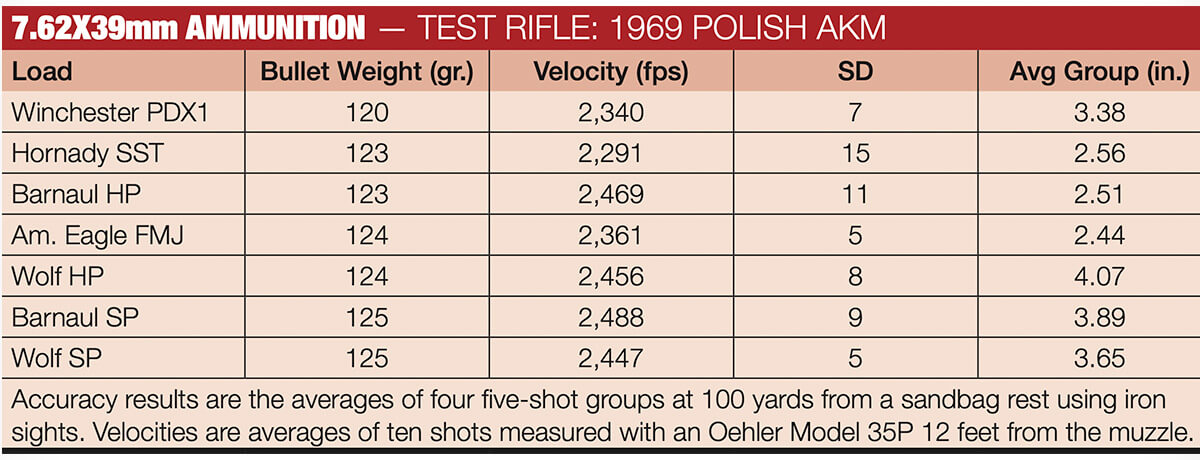
The accuracy results showed me that the commercial ammunition either being made in this country or imported from Russia is of solid quality. I have heard horror stories about ammo made in certain countries that you’ll never see here (Iraq for example), but when it comes to the stuff you can get here, it seems to be consistent. And with the availability and low cost of newly manufactured 7.62x39mm ammo you won’t really need to buy any “surplus” ammo of dubious quality. Plus, because AKs are more popular, most American ammunition manufacturers make at least one 7.62x39mm load.
As for the ballistic block tests, there did not seem to be much difference in performance whether in bare blocks or blocks covered with clothing. This is not the case when testing handgun ammunition, but I think the horsepower of the rifle round just overpowers what little resistance the clothing layers have. I think the tests showed exactly what a bonded core is supposed to do. The Hornady SST bullets did not shed their jackets, expanded, and penetrated deeply. Too deeply, in fact, if you’re worried about shoot-throughs in an urban setting. The Winchester PDX1 bullets performed exactly as advertised — the front half of the bullet fragmented, and the bonded base continued on, penetrating deeply.
The jackets of both the Wolf and Barnaul bullets are not bonded to the cores, and as a result they tend to separate. The jackets peel off and penetrate a foot or so, while the core (or most of it) penetrates more deeply. This is true whether it is a soft-point or hollowpoint bullet, although the HP bullets tended to fragment more violently. If you want as much of your bullet’s energy dumped into the first 16 or so inches of target, and aren’t worried about intermediate barrier penetration, Wolf or Barnaul HP bullets might be for you. If you want a load with performance between the Hornady bonded core and the Wof/Barnaul bullets, the Winchester PDX1 load seems to provide a nice balance between penetration and fragmentation.
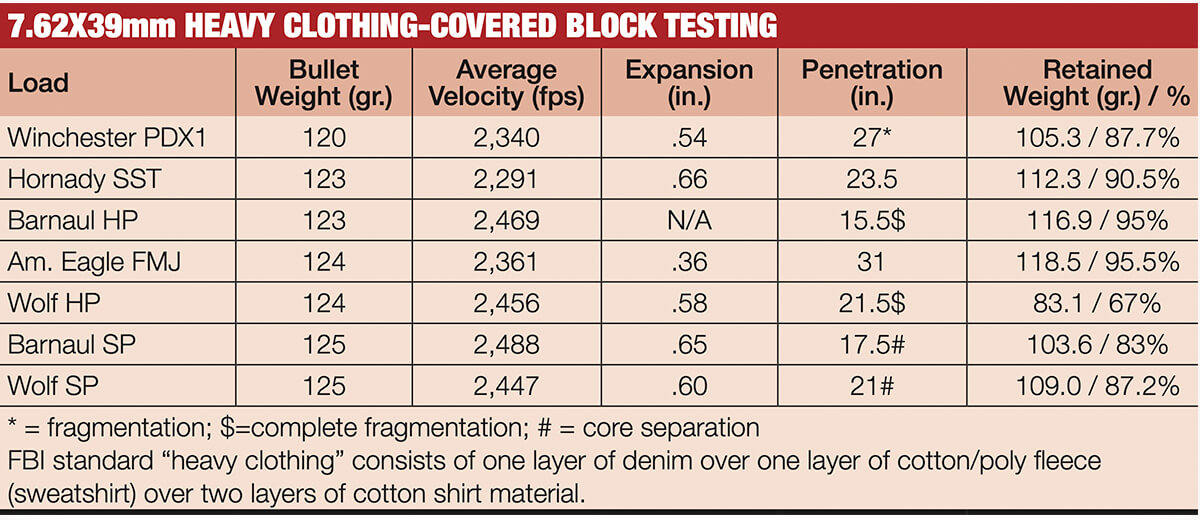
The simple FMJ bullets to me provided very interesting results. Because the 7.62x39mm bullets are not that heavy for caliber, and for rifle bullets are not travelling very fast, they did not penetrate as deeply as I was expecting. However, you will note that the bullets penetrated over thirty inches, which means if you like FMJ bullets for their ability to penetrate barriers, if you happen to shoot a bad guy with them that bullet will zip right on through him and keep on going.
About the Author
James Tarr is a longtime contributor to Firearms News and other firearms publications. A former police officer he is a USPSA Production Division Grand Master. He is also the author of several books, including CARNIVORE, which was featured on The O’Reilly Factor. His current best-selling novel, Dogsoldiers, is available now through Amazon.
If you have any thoughts or comments on this article, we’d love to hear them. Email us at [email protected].
Read the full article here


